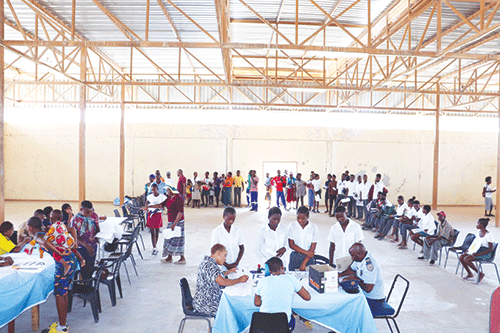Reino Kampende, a father of four, expressed joy that his children had received identification cards and birth certificates for the first time through the Ministry of Home Affairs, Immigration, Safety and Security’s outreach programme that delivered national documents to hundreds of orphans and vulnerable children (OVC) in Kavango East and West regions recently.
“I am the happiest father in the world. My children missed out on several opportunities to obtain social grants because they had no national documents,” he noted.
The initiative, funded by the United States President’s Emergency Plan for AIDS Relief (PEPFAR) via the United States Agency for International Development (USAID), and supported by the Reach Namibia initiative, aims to address the challenges faced by OVC in obtaining essential national documents.
The lack of national documents had previously deprived many families of social grants and other opportunities. Reach Namibia facilitated the issuance of national documents to 781 OVC in the two Kavango regions.
Samson Ndhlovu from Intrahealth Namibia highlighted that household assessments revealed a significant need for such documentation.
“Living in Namibia’s rural areas presents challenges for parents or guardians, who often lack awareness or means to apply for these crucial documents,” he said, adding that the outreach initiative not only raised awareness, but also brought essential services directly to the people.
USAID Country Representative McDonald Homer emphasised the importance of national documents, stating that they are essential for accessing public and private services, pursuing education, and seeking employment.
Expanding its impact, the outreach initiative provided national documents to more than 3 000 community members, further underscoring the programme’s commitment to inclusivity.
Elina Sintungu, a beneficiary from Nzinze village, expressed gratitude, highlighting that the initiative provided a crucial opportunity for her children to obtain birth certificates and for her to access information about social grants.
“Although I had my own national documents, I did not have the money to take my children to the home affairs’ office in Nkurenkuru. Only now, when the ministry’s people came to the region, was I able to obtain birth certificates for my children. I also got information and initiated the first steps on how to apply for social grants for them,” she said with a smile.
The Reach Namibia programme, funded by the united states of America, collaborates with local organisations to deliver integrated health and social services to children, adolescents and youth.
Among its key interventions is the emphasis on informing caregivers and parents about the importance of birth registrations, and guiding them through the process of obtaining national documents.


